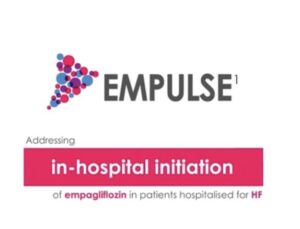
SGLT-2 inhibition in acute heart failure
The EMPULSE TRIAL was presented as late breaker at the American Heart Association congress by prof. dr. Voors of the UMCG.
The EMPULSE randomized 530 patients to either 10 mg of empagliflozin or placebo as soon after in-hospital stabilization. The primary composite endpoint consisted of time to death, frequency of heart failure events, time to first heart failure event, and change in quality of life score from baseline. The primary analysis was assessed as a stratified win ratio, allowing hierarchy within the composite endpoint.

For the primary composite endpoint, patients treated with empagliflozin were 36% more likely to experience a clinical benefit in the first 90 days (stratified win ratio 1.36; 95% CI 1.09-1.68). Numerically, rates of death (4.2% vs 8.3%) and heart failure events (10.6% vs 14.7%) were lower in the SGLT2 inhibitor arm. Improvement in quality of life was the key driver of the difference in the primary endpoint: placebo-adjusted mean difference at 90 days was 4.5 points favoring empagliflozin.
Regarding safety, both serious adverse events and any adverse events were less prevalent in the empagliflozin arm.
These findings confirm the earlier trends found in EMPA-RESPONSE-AHF, a pilot study initiated from the UMCG randomizing patients admitted with acute heart failure to empagliflozin 10 mg or placebo.
